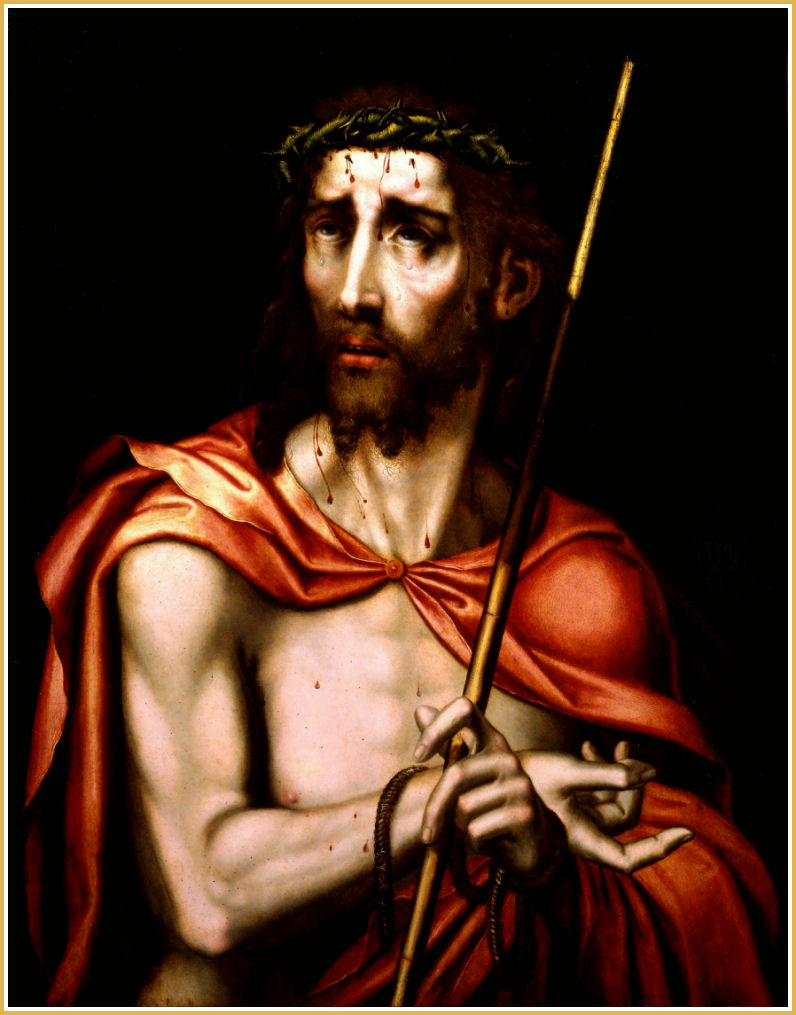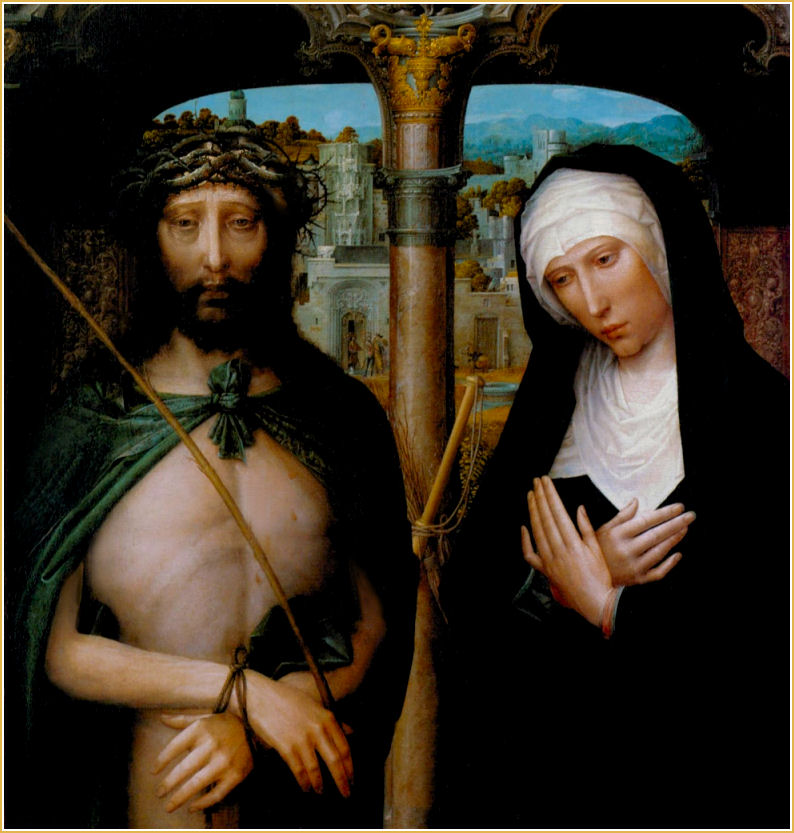

Excerpts from MEDITATION ON THE PASSION
Rev. Reginald Walsh, O.P.
Burns Oates & Washbourne LTD, London
with Nihil Obstat and Imprimatur, 1922
"ECCE HOMO!"
The last proceedings, by which our Lord's final condemnation was finally brought about, fall naturally into three scenes, each showing a renewed effort on Pilate's part to save Him, and a counter-effort of the Jews to frustrate it: (1) "Ecce Homo!" (2) Further examination. (3) Last decisive words.
1. "Ecce Homo!" See Pilate leading our Lord, scourged, thorn-crowned, and clad in the purple garment, to a balcony, where He could be seen by the whole people. "Jesus came forth," St. John tells us, "bearing the crown of thorns and the purple mantle."
Contemplate our Blessed Lord as He is led from the inner court, the barrack-yard, back into the great court in front of the Praetorium; , and thence up the sacred steps, the Scala Sancta, to the hall where Pilate awaits Him. Help us, Blessed Mother, to see what you see, to hear what you hear, and to share in your loving compassion. Watch our dear Lord as He is forced by the pitiless guards to mount the long flight of steps, sanctified ever since by His painful journeys up and down. Mark how His limbs, exhausted by loss of blood and extreme agony, fail Him; how often He stumbles and needs to be dragged upwards by the guards. O suffering Lord Jesus, bid me to come to Thee, strengthen me to suffer with Thee!
Listen to Pilate: "I bring Him forth unto you, that you may know that I find no cause in Him." Then Jesus came forth, and Pilate said: "Behold the Man!"
For a moment all tongues are hushed. The people press forward. An exclamation of horror burst from the multitude, followed by a dead silence, when Jesus with great difficulty raised His wounded head, crowned with thorns, and cast His exhausted glance on the excited throng. Ah, Lord Jesus, cast Thine eyes of mercy upon me, let Thy look of pity and love rest on me, and detach me for ever from all earthly things. May my love for Thee grow daily, even hourly, more intense and true. O Sacred Heart of Jesus, I believe in Thy love for me. Behold the Man! Dear Lord, let me look and look until the fire which Thou camest to cast on earth begins to burn in my heart. Behold
the Man! Ah, my Jesus, when troubles grow, and I am tempted to lose patience, may I recall these words, Behold the Man! and remember I have not yet resisted unto blood. May Thy look, dear Jesus, fill my heart with a burning zeal for souls and urge me to spend myself in Thy service.
The hatred of the High Priests and their followers was, if possible, increased at the sight of Jesus, and they cried out: "Put Him to death! crucify Him!" ... Then the multitude joined in the cry: "Crucify Him! crucify Him!" Pilate sounded the trumpet to demand silence, and said: "Take Him you, and crucify Him, for I find no cause in Him." Hear the words of the Priests - words of the sinner against the Saviour: "We have a law, and according to that law He ought to die, because He made Himself the Son of God." Self is the sinner's god! Note the fear and hesitation of Pilate as he hears these words -"He made Himself the Son of God." He takes Jesus into another room and questions Him: "Whence art Thou?" Pilate was so struck. by His calm majesty, His silence, and His patience in the midst of cruel injustice and pain that he asked Him: "Whence art Thou?" Pilate wanted to know if Jesus was a mere man or if there was any truth in the belief of many that He was more than man - that He was God. But Jesus made no answer.
"Speakest Thou not to Me?" said Pilate. "Knowest Thou not that I have power to crucify Thee and power to release Thee?" Jesus replied: "Thou shouldst not have any power against Me unless it were given thee from above, therefore he that hath delivered Me to thee hath the greater sin." When Pilate heard this he feared the more - "for wickedness is fearful, and a troubled conscience forecasteth grievous things" (Wis. xvii.).
COLLOQUY. - O my God, my dear Master and Redeemer, may Thy Kingdom come! May Thy Will be done! May I never hesitate. Yes, dear Lord, not as I will but as Thou wilt. Blessed Mother of God, pray for us sinners that we may learn to say: Lord Jesus, I am Thy servant, be it done unto me according to Thy word. Take, Lord, take and receive my entire liberty - all that I have, all that I am, all are Thine. Give me only Thy love and grace, and I have nothing more to ask.
2. Further examination.
"He that delivered Me to thee hath the greater sin." These words refer to Caiphas. From the forgiving Heart of Jesus a grace passes with these words into the stony heart of Pilate, this worldly man who has been the cause of so much pain and shame to Him. Pilate is once more roused to a sense of justice. Once more is set before the judge life and death, good and evil - that which he shall choose shall be given to him. It is the last struggle between grace and worldly selfishness, or selfish worldliness. "And from henceforth Pilate sought to release Jesus," St. John tells us. Pilate, then, has once more some better thoughts. A good seed is again cast into his soul, that it may be covered up and nurtured there and allowed to grow. A spark of life has come back. Oh, that it may be sheltered from the cold blast that will else extinguish it. Pilate ought to have barred his doors and not allowed his tempters to come near him. The bold daring of the Priests and Ancients unmans his weakness; in their presence he is brought to nought. What a lesson - to shun the occasions of sin or infidelity to our Lord.
Certainly it is, even in this eleventh hour, the wish of the most merciful Heart of Jesus that Pilate may be converted and live. He sought to release Jesus. Alas! he does not set rightly to work. He goes out to parley once more with our Lord's enemies, for whom he, weak man, is no match. What chance has the spark of life within him of surviving the storm which a fair attempt is sure to rouse in the souls of those tyrants! Once more Pilate goes forward and says: "I find no cause in Him; I will release Him." But the Jews cried out, saying: " If thou release this Man thou art not Caesar's friend. For whoever maketh himself a king speaketh against Caesar." The cry, "If thou release this Man thou art not Caesar's friend," rises above all the conflicting elements in Pilate's soul as a thunder peal. It is as if the bolt had struck him. All struggle in his conscience is ended. Christ or Caesar? Pilate chooses to be Caesar's friend - and Satan's slave.
How dreadful to put Jesus Christ and the world or self into competition - above all in the case of a seeker after perfection - "And yet I planted thee a chosen vineyard, all true seed; how then art thou turned unto Me into that which is good for nothing, O strange vineyard?" O Blessed Mother of God, pray for us sinners, that we may not be led into temptation. Grant me, my Jesus, this favour, which I humbly beg of Thee through Thy love for me, that love unto death, that Thou keep me inseparably united to Thee in life and in death - that nothing may be able to separate me from Thee. May Thy Passion, dear Lord, strengthen me to suffer and die for Thee. Detach me from everything - here burn, here cut, here mortify all that is opposed to Thy most holy Will - do with me, O Lord, what Thou wilt, for I know that Thou lovest me.
3. Last decisive words.
Pilate had no moral courage to oppose the resolute and ingenious project, and the passion of the Jews, and so he was vanquished. He has not even, like them, the sorrowful distinction of owing his ruin to a great passion. He feared his conscience, but he feared Rome more, and his own interests were more to him than anything else. So he succumbed to human respect and self-seeking. This last vice made Pilate a coward, a criminal, an unjust judge, and a murderer of the Son of God.
Hear Pilate as he continues to address the Jews: "What shall I do, then, with Jesus that is called Christ? Shall I crucify your King?" The Chief Priests answer: "We have no king but Caesar!" The people blindly follow the example of the Priests rather than their God. So, too, Pilate bows down before the will of the wicked Priests rather than, do his duty to God. The Priests themselves choose to worship Caesar rather than God.
Here once more we see the terrible truth that a large proportion of men perish through human respect. The Chief Priests are few, but the many slavishly follow them. And this shows us what a responsibility rests on each of us - and the glorious position we can secure for ourselves if we will. For God has so arranged that we cannot fail to influence others for good or for evil. We can each, if we will, become a leader, to guide and help others, by our courage and fidelity in our Lord's service, to be faithful to Him unto death. We can each be a mediator, a Jesus, to bring about a reconciliation between our God and our neighbour. And is it not the end for which our Lord has called us ? Every soul who labours earnestly after its own personal sanctification is sure to become a good instrument in our Lord's hands for the salvation of others.
"Away with Him! Crucify Him, crucify Him! We have no king but Caesar!" An awful rejection, a deliberate denial of God - the Creator set at nought by the creature - the love of God despised! ignored! rejected! How painful and humiliating this was for our dear Lord. With how much truth He might have made to these people the reproaches that the Church puts into His mouth on the day on which we celebrate the memory of His Passion: "My people, what have I done to thee, or wherein have I grieved thee? I led thee out of Egypt, and cast Pharao into the Red Sea, and thou hast delivered Me up to the Chief Priests - I went before thee in a pillar of cloud, and thou hast led Me to Pilate's Praetorium - I fed thee with manna, and thou hast scourged Me - I struck down the kings of the Canaanites, and thou hast struck My head with a reed -I gave thee a kingly sceptre, and thou hast crowned Me with thorns - I exalted thee with great power, and thou wilt raise Me upon the Cross. What more could I have done for thee that I have not done?" No, He could not have done more for His chosen people. There was nothing left for Him to do but to let them have their bitter will, and consummate the terrible fate the nation was about to incur by its own fault. What has Jesus done for me? What have I done for Him? What have I to say to Him now as I kneel at His Sacred feet?

Pilate, seeing that all his efforts were vain, that he could make no impression on the infuriated mob - their yells and imprecations were deafening - fearing an insurrection, called for water, and washing his hands before the people, said: "I am innocent of the blood of this just Man; look you to it!" A frightful and unanimous cry then came from the dense multitude, who are assembled from all parts of Palestine: "His blood be upon us and upon our children." What can be more thorough than their rejection of our Lord! - "Not this Man, but Barabbas!" "Behold the Man!" - "Crucify Him, crucify Him!" "Behold your King " - "Away with Him, away with Him; crucify Him!" "Shall I crucify your King " - "We have no king but Caesar." "I am innocent of the blood of this just Man" - "His blood be upon us and upon our children!"
Oh, let us take heed, listen, and learn. For what is it that hath been? The same that shall be. Mark well what a terrible supremacy is allowed to the free will of man. "His blood be upon us and upon our children!" That cry seems to be but a word, a passing word; yet, see how it endures. The Jews to the present day have never revoked that word of their fathers. We understand, as we look upon their fixity of purpose, how sin can be everlasting in the world to come, and how it is that the malice of the fallen Angels lives on through all ages. Ah, let us try as well as we can to form some notion of the grief our Lord experiences in His faithful, loving Heart while He listens to this solemn and final decree against Him. "My people, what have I done to thee? Yet I planted thee a chosen vineyard. Return, O ye revolting children - great as the sea is thy destruction." To the loving heart of Jesus the loss of His people is great as the sea. How can we be unfaithful and ungrateful to so tender a Father, Lord, and God?
COLLOQUY. -
"O burning Heart, O Jesus mine,
O make me love with love like Thine."
May Thy grace, O Lord Jesus, make that possible to me which seems impossible to me by nature - Thou knowest, dearest Lord, that I can bear but little, and that I am quickly cast down by small adversity. Put an end, my Jesus, to all my meanness and cowardice in Thy service. May all opportunity of humiliation and mortification be sweet to me henceforth, and every occasion of suffering give me new courage and stronger love. O Blessed Mother! turn thine eyes of mercy towards us and show us the loving Heart of thy Son Jesus. O Heart of Jesus! most faithful to those whom Thou callest to Thy love. Ah, influence my wretched heart that it may burn with love for Thee, as Thine dost burn with love for me. O Mother, I have need of thee! O make me love Jesus, thy Son. Amen.


HOME ------------------------------------------------------------------------------------------------------------------------------------------------------------------------------------------------------------------------ CHRIST THE KING
www.catholictradition.org/Passion/passion34e.htm